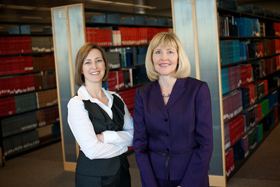Impacts of Giving
Jonas Center for Nursing Excellence helps nurses pursue doctoral degrees
Helping the most vulnerable through system-level health-care changes

Doctoral students Sheridan Miyamoto and Deborah Greenwood
Sheridan Miyamoto, a family nurse practitioner and student in the doctoral program at the Betty Irene Moore School of Nursing, seeks to affect policy change to improve the protection of some of society’s most vulnerable members—children and youth in abusive or neglectful homes.
Miyamoto approaches these policy issues with years of experience as a clinical first-responder to child abuse. She spent 12 years as a sexual assault examiner on a pediatric sexual abuse emergency response team. More recently, she worked as the medical clearance exam program coordinator at UC Davis Medical Center’s Child and Adolescent Abuse Resource and Evaluation Diagnostic and Treatment Center, where she provided health and forensic services for children prior to their placement in foster care after being removed from their homes.
Starting the doctoral program at the School of Nursing was, for Miyamoto, a path to affect broader, system-level change on issues surrounding the protection of at-risk youth.
“I felt like there were other, higher-level problems that I could see, but I didn’t have the tools to move forward to address them and help more children,” Miyamoto said.
For her doctoral dissertation, Miyamoto plans to examine the impact that changes to child welfare’s child removal policy have had on severe or fatal child abuse injury rates. By reviewing this data, Miyamoto aims to answer whether the child protective system is accurately identifying the children in the county in greatest need of protection.
“I felt like there were other, higher-level problems that I could see, but I didn’t have the tools to move forward to address them and help more children."
—Doctoral student Sheridan Miyamoto
Miyamoto would like to see health-care providers—who are mandated reporters of child abuse—receive more education about the subtle signs of abuse and help them become more comfortable making reports to child welfare services.
“We absolutely need to be educating residents and nurses about child abuse and neglect,” she said. “Health-care providers have an opportunity to intervene and offer help to families and children and prevent maltreatment and injury.”
Using technology to treat chronic conditions
Diabetes is a condition that affects people 24 hours a day, and yet the health-care system is not set up to effectively provide ongoing care to people living with this condition.
That is a challenge that Deborah Greenwood, a doctoral student at the Betty Irene Moore School of Nursing and diabetes clinical nurse specialist with Sutter Medical Foundation, aims to address.
“There needs to be a chronic-care approach,” said Greenwood, who is also the program coordinator for seven Sutter Health-affiliate diabetes self-management education and training programs in Northern California. “There’s a real opportunity to manage diabetes from the home, instead of just the 15-minute primary-care appointment every quarter.”
Through the doctoral program, Greenwood is using her knowledge of diabetes to explore how telehealth can improve the health of people living with Type 2 diabetes. Telehealth enables health-care providers and individuals who are geographically separate to take part in live, interactive consultations using telecommunications technology such as video.
“I think there’s great promise in the ongoing monitoring and ongoing access that is facilitated by telehealth to improve health outcomes.”
—Doctoral student Deborah Greenwood
Many people with diabetes struggle to achieve health goals related to blood sugar levels, blood pressure, cholesterol and weight, further compromising their health and quality of life, Greenwood said. Telehealth can be a tool to help individuals meet these goals.
“I think there’s great promise in the ongoing monitoring and ongoing access that is facilitated by telehealth to improve health outcomes,” Greenwood said.
Greenwood hopes her research will demonstrate effective uses of telehealth in the management of chronic conditions.
“I want to be involved in the change process that needs to occur to incorporate telehealth into diabetes and chronic health-care management,” she said.
The importance of scholarship support
Miyamoto and Greenwood are recipients of financial support for their education through the Jonas Nurse Leaders Scholar Program, an initiative of the New York-based Jonas Center for Nursing Excellence. This national program aims to increase the number of doctorally prepared nurse educators and leaders, in an effort to reduce the nursing faculty shortage and better address the health-care needs of society in the future, from treating chronic conditions to offering culturally competent care.
“Recognition from national thought leaders such as the Jonas Center for Nursing Excellence is a great honor for our students,” said Heather M. Young, associate vice chancellor for nursing, UC Davis Health, and dean and professor, Betty Irene Moore School of Nursing. “This opportunity will connect our students to a national network of future leaders and will add a unique dimension to their academic training.”
“Scholarship support is incredibly critical,” Miyamoto said. “Without it, returning to school would have been much more difficult.”
For Greenwood, scholarship support has allowed her to reduce her work schedule from full-time to half-time to accommodate her research and class work.
“This additional funding to support my pursuit of this doctoral degree is very valuable,” she said.





